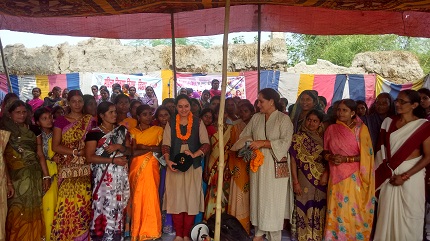MISCELLANEOUS

A popular perception of the state of Bihar, brings to mind several infrastructural challenges. However, when a few key members of the board at CARE and I got the opportunity to visit one of our project sites, a village called Kalanaur in Jehanabad district of Bihar, we were pleasantly surprised. This field visit was a part of the Board Meeting held in Patna last November.
We witnessed that houses in the village could sustain their electricity requirements with the help of solar panels. Toilets, though not ubiquitous, villagers seemed to be aware of the importance of hygiene and sanitation. Our interaction with the residents, revealed the quantum of change that has happened in their lives, and how much they have grown as a community, whether it is something as intangible as their attitude towards their women, or something as basic as sanitation.
CARE India’s Gram Varta initiative runs a number of self-help groups in this region. These groups do more than just provide their participants with a means to fulfill their basic needs. They help these women address critical issues, such as early marriage, malnutrition and at times, something as basic as washing hands. The groups initiated by this program mobilized community members to build toilets at home, treat malnutrition and prevent early marriage. These women now act as a support system for each other, which is amazing, because there was a time when the same women hid behind their veils and never spoke in public.
A high number of women, cited illiteracy as a key cause of historic prevalence of domestic violence at home. Alcohol and dowry are also some of the common reasons cited for prevalence of domestic abuse in this area. CARE runs a women’s cell in the district which aims at addressing these problems faced by the women. The cell has been deliberately placed in the district administration center so that these issues get the much deserved attention.
As part of the initiative to support the Bihar government, CARE has created a platform for social health activists from around the state to get together and consult each other. These consultations help in creating better and more efficient strategies to extend our reach, and assess the quality of healthcare in the state. They also help the health centers reach out to more and more patients, keeping in mind the capacity of the health centres.
This visit was a first-hand experience of the challenges faced by our team on the ground, but it was also great to see them overcome these obstacles. Talking to the frontline workers helped us gauge the impact of our work and understand, how CARE has helped tackle some major issues that can deter development. The field visit was indeed a satisfying one, and reflecting back on it will help the organization move forward with newer strategies and innovations, and make a real difference in the lives of the people we work for.




